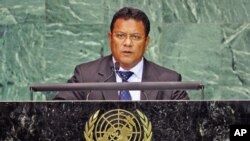The President of Nauru, the world’s smallest Pacific island nation, which is in serious danger from rising sea levels, appealed to the U.N. Security Council on Wednesday to take concrete action to help his country and others mitigate the effects of climate change. His remarks came during a rare discussion in the council on the security implications of climate change.
President Marcus Stephen addressed the Security Council on behalf of several Pacific island nations that are vulnerable to the effects of climate change. He said his and other island states face the single greatest security challenge from global warming.
"In climate change, our islands face dangerous and potentially catastrophic impacts that threaten to destabilize our societies and political institutions. Our food security, water security, and public safety are already being undermined," said Stephen. "Sea level rise is eroding our coastlines and in some cases damaging critical infrastructure. Territory loss could disrupt traditional systems of land ownership and spark conflicts over this and other increasingly scarce resources.”
Stephen warned that eventually some islands might disappear, and with them thousands of years of cultural heritage.
“This would force large numbers of our citizens to relocate; first internally, then across borders,” he said.
Stephen called on the U.N. Security Council to recognize that climate change is as great a threat to international peace and security as nuclear proliferation or terrorism, and that it carries the potential to destabilize governments and start conflicts.
He urged the council to appoint a U.N. special representative on climate and security, as well as to request an assessment of the U.N.'s capacity to respond to the impact of global warming.
The United Nations has warned about the potential effects of climate change on security, and Secretary-General Ban Ki-moon spoke about it to the Security Council. He said climate change is real and accelerating dangerously, threatening global food and water supplies and undermining stability.
“Competition between communities and countries for scarce resources - especially water - is increasing, exacerbating old security dilemmas and creating new ones," said Ban. "Environmental refugees are reshaping the human geography of the planet - a trend that will only increase as deserts advance, forests are felled and sea levels rise. Megacrises may well become the new normal. These are all threats to human security as well as to international peace and security.”
The Secretary-General called on U.N. member states to implement climate agreements made in Cancun and Copenhagen, and to provide funding to help vulnerable developing countries mitigate the effects of climate change.
Ban also noted that extreme weather events are becoming much more common, and pointed to the intense drought affecting Somalia, where the United Nations declared a famine Wednesday in two regions of that country.
The U.N. chief urged the Security Council to mobilize national and international action to confront the threats of climate change. But by midday, the council looked to be at a stalemate on reaching consensus on a statement on the subject.
Russia, China and several other council members argue that climate change should not be discussed in the Security Council, but by agencies such as the U.N. Environment Program.
U.S. Ambassador Susan Rice called their attitude “pathetic,” “shortsighted” and a “dereliction of duty.”
Wednesday’s debate was only the second time in four years that the Security Council has taken up this topic.
News
UN: Climate Change Could Cause Instability for Some Nations




